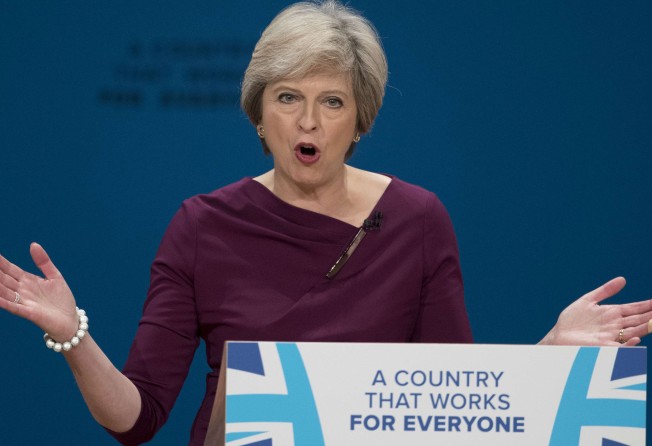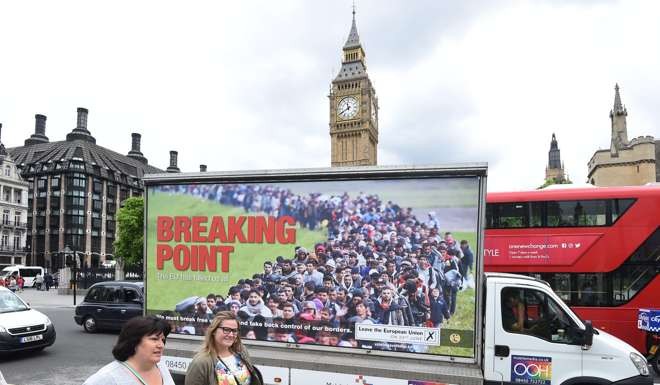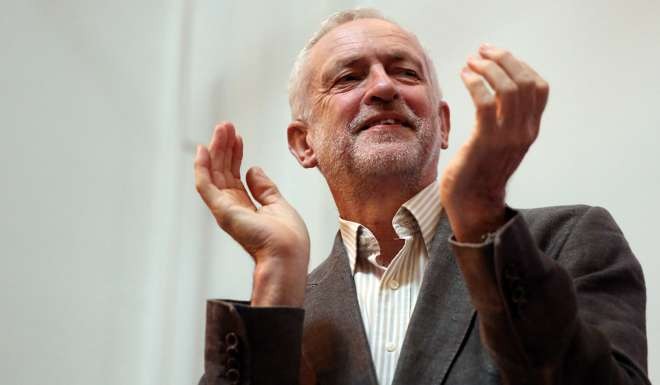Why Theresa May’s Brexit class war could channel rerun of that ’70s show in the UK
Niall Ferguson sees that the British PM wishes to make the best of Britain’s exit from the EU, but her attacks on the elite as she sought to out-labour Labour raise the spectre of events 43 years ago

“If you believe you’re a citizen of the world, you’re a citizen of nowhere.” Those were the key words of British Prime Minister Theresa May’s speech at the Conservative Party conference in Birmingham earlier this month. My response – as a fully paid-up member of the rootless cosmopolitan class – was: ooh la la!
Welcome to the new class war, Brexit edition.
On one side, the citizens of the world – the Weltbürger – only citizens in the sense that Orson Welles’ Citizen Kane was a citizen. (Actually, we fancy ourselves a new aristocracy, even though most of us are self-made.) We have at least two passports. We speak at least three languages. And we have at least four homes, not one of them in the town where we were born.
On the other side – seething with resentment against us – are you citizens of the nation state. You have one passport, if that. You hate the few words of French you learned at school. And you live within driving distance of your parents or your children.
No prizes for guessing which group is more numerous.
Well, we had a pretty good run. Nearly 30 years of globalisation, information technology and bubbly asset markets, until 2008. And what fun it all was. Since the financial crisis, however, the tide has turned, despite such inspired devices as quantitative easing. We may as well face it: 2016 has been the global elite’s annus horribilis.
When we met at Davos in January, we could still laugh at Donald Trump. Then he won the Republican nomination. When we met again in Aspen in the spring, we could still joke about Boris Johnson. Then he (inadvertently) led Brexit to victory and became foreign secretary. All summer long – from Lake Como to Martha’s Vineyard – we clung to the hope that the economic consequences of Brexit would be so dire that the voters would repent. Wrong.
Now, as the nights draw in, we rootless cosmopolitans have gathered in Washington for the usual International Monetary Fund meeting. Our glorious leader, Christine Lagarde, issues the perennial warning against protectionism. We congratulate another club member, former Portuguese prime minister Antonio Guterres, on his appointment as UN secretary general. But we have to agree with German finance minister Wolfgang Schäuble when he says: “More and more, people don’t trust their elites.”

Cue Theresa May. As Paul Goodman pointed out last week, you can’t understand “Mother Theresa” without knowing something of her upbringing as the child of a provincial Anglo-Catholic clergyman. Yet what we heard from her last week was more than simply a high church version of Christian democracy. And those who think she is simply the Oxford University Conservative Association’s answer to Angela Merkel are missing some very big differences.
May’s conference speech did three extraordinary things. First, she made it clear that we are destined for “hard Brexit”. She has understood that the country voted to restrict immigration, and ending free movement of EU citizens must mean our departure from the European single market. She has therefore decided to make the best of it. Her appeal to voters of the UK Independence Party – those who “find themselves out of work or on lower wages because of low-skilled immigration”– was as unambiguous as her allusion to the “social contract that says you train up local young people before you take on cheap labour from overseas”. Ooh la la!
Second, this was a complete repudiation of Thatcherism, aimed directly at disillusioned anti-Corbynite Labour voters. Indeed, whole chunks appeared to have been lifted from speeches by Labour leaders, from Neil Kinnock to Ed Miliband: “A plan that will mean government stepping up. Righting wrongs. Challenging vested interests. Taking big decisions. Doing what we believe to be right. Getting the job done. Because that’s the good that government can do.”
“The good that government can do.” She used that phrase five times. She pledged “to put the power of government squarely at the service of ordinary working-class people”. She even asserted that “the state exists to provide what … markets cannot”, declaring her readiness to “intervene … where markets are dysfunctional”.

Most breathtaking of all was the promise of “a new industrial strategy … identifying the industries that are of strategic value to our economy and supporting and promoting them”.
By the time Mrs May was finished, stunned Tories had signed up for workers’ representation on company boards, and were cheering their new identity as “the party of the workers, the party of the public servants”. After she name-checked Clement Attlee, was I alone in expecting Gordon Brown to appear on stage as postmaster-general in the new National Government? No one can dispute the audacity of this bid to define the Conservatives as “the new centre ground of British politics”, as opposed to what she dismissively called “the socialist left and the libertarian right”.
Yet the most daring part was her sustained barrage against the “privileged few … the rich, the successful and the powerful … the powerful and the privileged”. Not since Edward Heath called Tiny Rowland “the unacceptable face of capitalism” in 1973 has a Tory leader talked this way.
And that is precisely what perturbs me. Months ago, I warned that a vote for Brexit risked throwing this country back to where it was 43 years ago, when we first joined the European Economic Community. I now fear this is exactly what Mrs May has in mind.
Forget the token nod to “the world’s leading financial capital”. Discount the lame reference to “Global Britain”. As the pound fell off a cliff last week, we were back in the 1970s: first the industrial strategy, then the sterling crisis. The Japanese got Abenomics. Just our luck to get “Abbanomics”– named in honour of Mrs May’s favourite band.
My favourite ’70s band was the Faces, and all this reminds me of one of their greatest hits: “P oor old Granddad ... He spoke of women’s ways / They’ll trap you, then they use you / before you even know”. The name of that song? Ooh la la.
Niall Ferguson is a senior fellow at the Hoover Institution, Stanford University